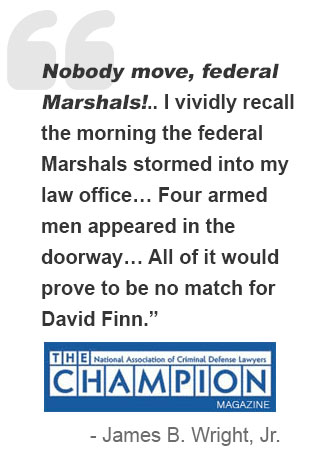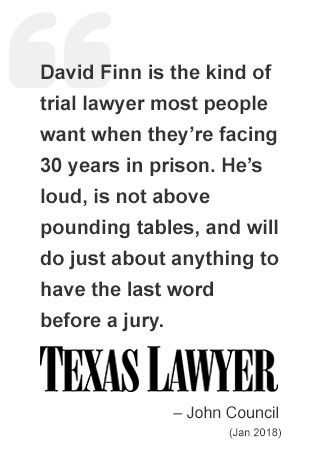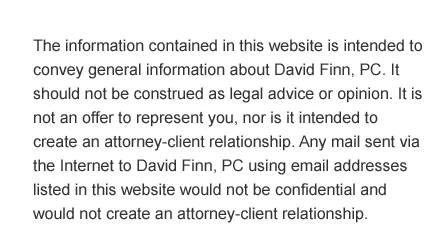


NACDL Weighs In on Blakley
July 12, 2004
Dallas Criminal Lawyer – David Finn
The Honorable Orrin Hatch
United States Senate
Washington, DC 20510
The Honorable Patrick Leahy
United State Senate
Washington, DC 20510
Re: Blakely v. Washington and the Future of the Federal Sentencing Guidelines
Dear Senators Hatch and Leahy:
We are writing on behalf of the National Association of Criminal Defense Lawyers (NACDL) to address the complex questions raised by the Supreme Court’s decision in Blakely v. Washington, a case in which the NACDL participated as amicus curiae in support of the petitioner Blakely. The NACDL, a professional bar association with more than 11,000 direct members and thousands more affiliate members, is the preeminent organization in the United States advancing the mission of the nation’s criminal defense lawyers to ensure justice and due process for persons accused of crime. We commend the Chairman for scheduling this hearing to consider the implications of Blakely for the Federal Sentencing Guidelines, and we offer our assistance as the Committee moves forward in an effort to develop a sentencing system that respects the fundamental constitutional right of jury trial.
Any examination of federal sentencing must start with the Sentencing Reform Act of 1984 (SRA). While the SRA arose from well-intentioned concerns regarding indeterminate sentencing, judges, practitioners, and academics have long questioned the efficacy and fairness of the resulting sentencing system, the Federal Sentencing Guidelines. Reducing “unwarranted sentencing disparity” was the primary purpose for the SRA, and, by this measure, few would describe the Guidelines as an unqualified success. Indeed, their most prominent effect has been a dramatic shift in power from the judiciary to prosecutors. In a prescient decision issued a week prior to Blakely, Chief Judge William G. Young painstakingly describes a criminal justice system in which the focus “has shifted far away from trials and juries and adjudication to a massive system of sentence bargaining that is heavily rigged against the accused citizen.” United States v. Green, (D. Mass., June 18, 2004) (holding the Federal Sentencing Guidelines unconstitutional).
The need for thorough deliberation.
We agree with Judge Young’s characterization – and with like views expressed by the majority in Blakely – and we believe that a careful and comprehensive reevaluation of the entire federal sentencing system is necessary. We note that the ABA Justice Kennedy Commission recently completed its year-long review of issues confronting the state and federal criminal justice systems. Formed to address problems identified by Justice Anthony Kennedy at the association’s 2003 annual meeting, the Commission issued a report that was sharply critical of inflexible and wastefully long federal sentences for nonviolent offenders. We recommend that Congress establish a similar commission — comprised of practitioners, prosecutors, judges and academics — to study the future of federal sentencing in the wake of Blakely.
One guiding principle for this process must be, as Justice Scalia writes in Blakely, “the need to give intelligible content to the right of jury trial” because “[t]hat right is no procedural formality, but a fundamental reservation of power in our constitutional structure.” This means exploring fully the experience of so-called “real-offense” sentencing under the Guidelines and the consequences of such an approach for due process and the right of jury trial. Under the current regime, uncharged allegations and allegations that may have been rejected by a jury are relied upon to increase significantly the defendant’s sentence without the basic procedural protections of a trial. Without any warning in the indictment or at the time of plea, evidence that flouts basic rules designed to ensure the reliability of fact-finding may add years or decades to a prison sentence if it seems more likely accurate than not. As Judge Young explains, the cornerstone of this so-called! “real offense” sentencing system is “relevant conduct” and that concept is “naught but the Department’s theory of the offense.”
Any system that fails to rectify these problems, and thus fails to honor the spirit as well as the letter of the Blakely decision, is constitutionally suspect. In our view, the only way to vindicate the Blakely jury-trial guarantee is to give meaning to the “right to insist that the prosecutor prove to a jury all facts legally essential to the punishment.”
Giving meaning to the constitutional right recognized in Blakely: The Kansas approach
The majority in Blakely notes with approval the measures adopted by the Kansas State legislature following invalidation of its state sentencing guidelines. Through modest amendments to its sentencing statutes, Kansas made the Blakely jury-trial right operative within the State’s existing sentencing regime. We strongly commend this approach to the Committee’s consideration.
Some may discount this approach based on the specious argument that the federal guidelines are more complicated than those used by Kansas. There are several reasons for rejecting this view. Requiring a jury to determine the facts legally relevant to the punishment is no more complicated – indeed, probably less so – than the statutory duty that a federal capital jury must perform: determine what aggravating and mitigating factors are present and then decide whether the aggravating factors “sufficiently outweigh” any mitigating factors so as to “justify a sentence of death.” Several district courts have voluntarily adopted a Kansas-like approach in the aftermath of Blakely. To the extent some enhancements prove unduly confusing for juries, this approach would have the added benefit of encouraging simplification of the Sentencing Guidelines.
That the Federal Sentencing Guidelines are amenable to this straightforward approach is implicit in post-Blakely charging policies adopted by the Department of Justice. In his July 2 memorandum to all federal prosecutors, Deputy Attorney General James Comey directs, “Prosecutors should immediately begin to include in indictments all readily provable Guidelines upward adjustments and upward departure factors (except for prior convictions that are exempt from the Blakely and Apprendi rules).” While this may be seen as a defensive litigation strategy (and one that the NACDL does not endorse without congressional authorization), it is not the first time the Department of Justice has conceded the workability of such a system. See Harris v. United States, 536 U.S. 545, 581-82 (2002) (Thomas, J., dissenting) (“The United States concedes, with respect to prospective application, that it can charge facts upon which a mandatory minimum sentence is based in the indictment and prove them to a jury.”).
The dangers inherent in any approach that evades Blakely.
We adamantly oppose an approach that would increase the top of each guideline range to the statutory maximum sentence for the offense of conviction (the so-called “Bowman approach”). Converting the guidelines maximum to the statutory maximum not only eliminates important protections against unwarranted disparity in sentencing, it evades the jury-trial right enunciated in Blakely and will be subject to serious constitutional challenge, creating confusion and new avenues for litigation that belie its rationale as a provisional set of rules.
While Professor Frank Bowman has argued that this approach would preserve the status quo, we think this prediction greatly underestimates the unwarranted disparities that will result in some jurisdictions. Permitting unbridled discretion to impose sentences upward to the statutory maximum, while maintaining current restrictions on mitigation, will compound the problems highlighted in Blakely and escalate sentences that are already too high (as denounced by Justice Anthony Kennedy at the American Bar Association’s 2003 annual meeting and by the association’s Justice Kennedy Commission in its recent report).
Regardless whether judges change their sentencing practices based on the dramatically higher maximum sentences, many prosecutors will use them to unfair advantage in plea bargaining by threatening to request sentences above the former guidelines maximums. Increasing the already disparate plea bargaining power in the hands of federal prosecutors would seriously undermine the core constitutional teaching of Blakely: “The Framers would not have thought it too much to demand that, before depriving a man of . . . his liberty, the State should suffer the modest inconvenience of submitting its accusation to ‘the unanimous suffrage of twelve of his equals and neighbours . . . rather than a lone employee of the State.'”
These concerns are not assuaged by the various proposals — such as directives to the Department of Justice and the courts and the right to appeal under an abuse-of-discretion standard — to discourage sentences above the minimum guideline sentence. With respect to the right to appeal above-minimum sentences, we doubt that the deferential abuse-of-discretion standard of review will have the intended deterrent effect. In any event, the Department of Justice is likely to render this protection meaningless through pre-existing plea-agreement practices that exact waivers of the defendant’s right to appeal.
Even if subject to a sunset clause, this approach rests on infirm constitutional footing and would undoubtedly produce more uncertainly and litigation. It requires that the Supreme Court maintain the distinction between minimum and maximum sentences – a doubtful proposition after Blakely. See Harris, 536 U.S. at 579-80 (Thomas, J., dissenting) (“there are no logical grounds for treating facts triggering mandatory minimums any differently than facts that increase the statutory maximum.”).
A short-term legislative fix is unnecessary.
We do not think immediate, short-term legislation is necessary. Indeed, at the time of this writing, one circuit court of appeals has held that Blakely does not apply to the Federal Sentencing Guidelines. United States v. Pineiro, (5th Cir., July 12, 2004). Some states with guidelines systems that run afoul of Blakely have announced their intention to consider the issue over time while the courts, prosecutors and defense counsel adapt current practices to conform to the law. If a short-term fix is deemed absolutely necessary, advisory guidelines are preferable to the so-called “Bowman approach.” Most importantly, advisory guidelines would avoid the constitutional infirmity and asymmetrical departure authority of the Bowman approach. Several states and the District of Columbia have adopted advisory sentencing guidelines, and we believe that such a system would be coherent, balanced and workable in the short-term. We note, however, that such an approach remains inconsistent with the spirit of Blakely and should be subject to a sunset clause.
We would welcome the opportunity to provide additional input regarding the various proposals for addressing Blakely and our view that any long-term approach must embrace the jury-trial guarantee announced in that decision. If you have any questions or would like further information regarding NACDL’s position, please contact Legislative Director Kyle O’Dowd: (202) 872-8600 x226 or kyle@nacdl.org.
Sincerely,
E.E. (Bo) Edwards
President
Barry Scheck
President-Elect
cc: Members, Senate Judiciary Committee
Phone Numbers
Office: (214) 538-6629







